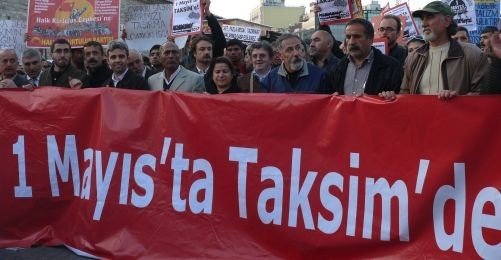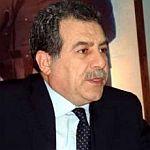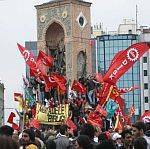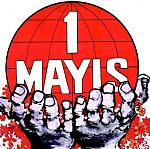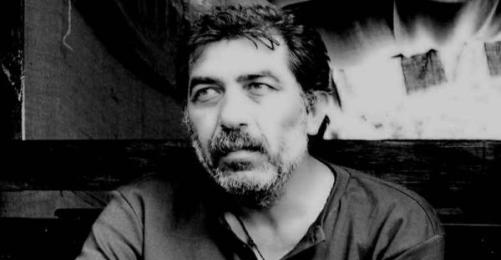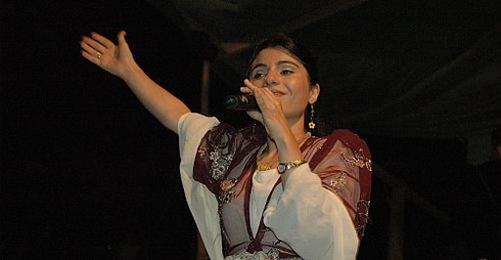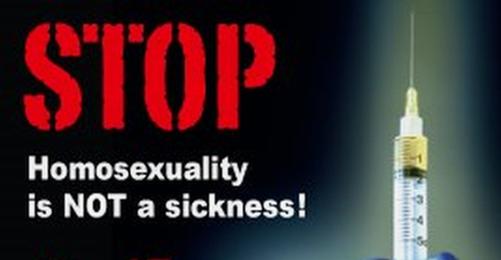Following the call of trade union confederations DİSK and KESK, the Union of Chambers of Turkish Engineers and Architects (TMMOB) and the Turkish Medical Association (TTB), around 500 people met at the Tünel Square in Beyoğlu, central Istanbul, in order to march towards Taksim Square on Saturday, 25 April.
However, at the time of the meeting, 5 pm, they were faced with police barricades and tanks.
The group organised a sit-down protest of around one and a half hours before dispersing in little groups, only to meet up in Taksim Square again at around 7.30 pm.
There they read a press statement.
KESK president Sami Evren said that “despite obstacles from the government, we will be in Taksim Square on 1 May.”
He called on workers, women, young people, itinerant traders, shopkeepers and political organisations to celebrate Labour Day in Taksim.
Initial gathering by workers and labour supporters in Tünel Square
At 5 pm, representatives of the Socialist Labour Movement (SEH), the Democratic Society Party (DTP), the “Call” (Çağrı) magazine, the People’s Liberation Party (HKP), the Contemporary Lawyers’ Association (ÇHD), the Freedom and Solidarity Party (ÖDP), the Socialist Platform for the Oppressed (ESP), the Independent Revolutionary Socialist Platform (BDSP), the 7th Package Initiative, the Socialist Feminist Collective, the Labour Movement Party (EHP), as well as striking MEHA textile wokers, Kurtiş printing press workers and Sinter metal workers had gathered together with trade union representatives at the Tünel Square.
They had shouted slogans such as “We will be on the Labour Day Square on 1 May”, “We will win by continuous resistance”, and “Side by side against fascism”.
Police intervention
The police, with tank barricades, prevented them from marching along the İstiklal pedestrian precinct to Taksim Square, even after DİSK president Süleyman Çelebi, Evren and lawyer Taylan Tanay from the ÇHD spoke to them.
After the sit-down protest, during which the group sang leftist marches and shouted slogans, the protesters agreed to meet again in Taksim.
During that time, a thirteen-year old male DTP supporter was held by the police at Odakule, a place between Tünel and Taksim, for some time.
Striking journalists not allowed to march
As on every Saturday since 13 February, striking atv-Sabah employers were planning to march from Taksim Square to Galatasaray Square, but they were not given permission, even after they offered to take off their strike aprons.
They thus joined the reading of the press statement by the Labour Day protestors in Taksim Square.
"A day of freedom and brotherhood"
The crowd continued to shout slogans in the square. Evren then said that they wanted Labour Day to be turned back into a public holiday of freedom and brotherhood in the country.
“Our agenda on 1 May 2009 is the crisis,” he said, adding that they were once again warning the government, which was abandoning workers in the face of the crisis.
The KESK president said that it had never been the fault of workers that Taksim had been a controversial topic for around thirty years. “Tension has always been created by governments.”
"Bloody 1 May"
Taksim Square has high symbolic value for workers. On 1 May 1977, later known as "Bloody 1 May", unknown assailants fired shots on a crowd of around 500,000 who had gathered in Taksim Square. The police is said to have attacked workers rather than looking for the perpetrators. In the ensuing chaos, 37 people died and many were injured. The event was never investigated satisfactorily.
1 May stopped being a public holiday in 1981, following the military coup a year earlier. Taksim Square became forbidden as a gathering place for workers.
In 2007 and 2008, workers insisted on gathering in Taksim, and faced great police resistance and also police violence.
Evren emphasised yet again the determination of workers to gather in Taksim, and warned that it would be the Justice and Development Party (AKP) government and Prime Minister Recep Tayyıp Erdoğan who would be responsible if anything happened. (BÇ/AG)





